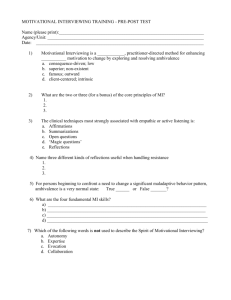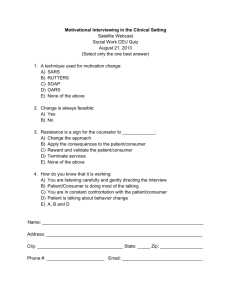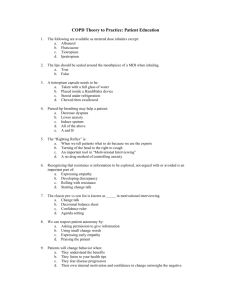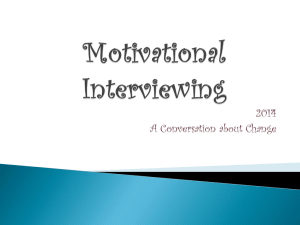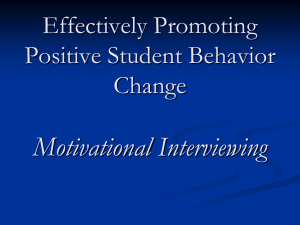T U N C
advertisement
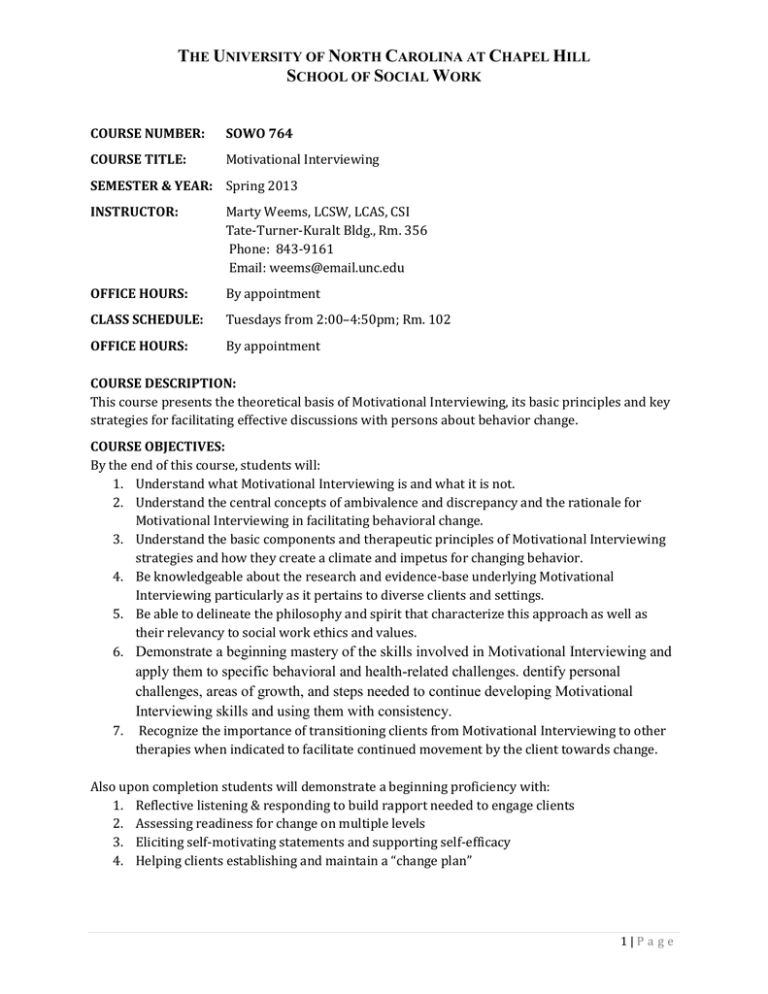
THE UNIVERSITY OF NORTH CAROLINA AT CHAPEL HILL SCHOOL OF SOCIAL WORK COURSE NUMBER: SOWO 764 COURSE TITLE: Motivational Interviewing SEMESTER & YEAR: Spring 2013 INSTRUCTOR: Marty Weems, LCSW, LCAS, CSI Tate-Turner-Kuralt Bldg., Rm. 356 Phone: 843-9161 Email: weems@email.unc.edu OFFICE HOURS: By appointment CLASS SCHEDULE: Tuesdays from 2:00–4:50pm; Rm. 102 OFFICE HOURS: By appointment COURSE DESCRIPTION: This course presents the theoretical basis of Motivational Interviewing, its basic principles and key strategies for facilitating effective discussions with persons about behavior change. COURSE OBJECTIVES: By the end of this course, students will: 1. Understand what Motivational Interviewing is and what it is not. 2. Understand the central concepts of ambivalence and discrepancy and the rationale for Motivational Interviewing in facilitating behavioral change. 3. Understand the basic components and therapeutic principles of Motivational Interviewing strategies and how they create a climate and impetus for changing behavior. 4. Be knowledgeable about the research and evidence-base underlying Motivational Interviewing particularly as it pertains to diverse clients and settings. 5. Be able to delineate the philosophy and spirit that characterize this approach as well as their relevancy to social work ethics and values. 6. Demonstrate a beginning mastery of the skills involved in Motivational Interviewing and apply them to specific behavioral and health-related challenges. dentify personal challenges, areas of growth, and steps needed to continue developing Motivational Interviewing skills and using them with consistency. 7. Recognize the importance of transitioning clients from Motivational Interviewing to other therapies when indicated to facilitate continued movement by the client towards change. Also upon completion students will demonstrate a beginning proficiency with: 1. Reflective listening & responding to build rapport needed to engage clients 2. Assessing readiness for change on multiple levels 3. Eliciting self-motivating statements and supporting self-efficacy 4. Helping clients establishing and maintain a “change plan” 1|P a g e THE UNIVERSITY OF NORTH CAROLINA AT CHAPEL HILL SCHOOL OF SOCIAL WORK EXPANDED DESCRIPTION: Even when clients wish to make important changes in their life, e.g. stop certain behaviors, adapt a healthier life-style, and/or become compliant with a treatment regimen, making behavioral changes can be very challenging. This course is an advanced direct practice elective which introduces students to the theoretical basis of Motivational Interviewing (MI) its basic principals, philosophy and skill sets. Motivational Interviewing is a directive, client-centered, evidence-based practice modality used to help clients explore and resolve ambivalence about making needed changes. The knowledge and skills learned in this course will be applicable to a wide range of diverse kinds of settings, problems, and populations. Students will have the opportunity to learn and practice MI strategies in an in-depth manner. Each session will include a brief lecture, followed by videotapes or demonstrations and then guided student practice sessions. Students will have choices on some of the readings to insure that these assignments match their interests and settings. REQUIRED TEXT/READINGS: Miller, W. & Rollnick, S. (2013). Motivational interviewing: Helping people to change (3rd ed.). New York, New York: The Guilford Press. Class handouts will be used extensively in this course and provided during class activities in advance of the classes. Motivational Interviewing Website: http://motivationalinterview.net TEACHING METHODS: This course will consist of the following: 1. Brief lectures on the rationale for, theoretical underpinnings, basic principles, and intervention strategies of motivational interviewing; 2. In-person and DVD demonstrations on how to implement motivational interviewing skills; 3. Practice and demonstration skills sessions in triads or larger groups; and 4. Providing and receiving feedback to your peers. The development of a supportive learning environment, reflecting the values of the social work profession, is essential for the success of this class. A supportive learning environment is fostered by listening to the ideas and views of others, being able to understand and appreciate a point of view which is different from your own, articulating clearly your point of view, and linking experience to readings and assignments. I will appreciate your contributions to making this a safe and respectful class for learning and growth, particularly by giving honest and constructive feedback to your peers. CLASS ASSIGNMENTS Progress and achievement of the course objectives will be evaluated on the following three criteria: 1. Class participation (33%) – This will be based on class attendance, thoughtful participation in class discussions, and active involvement in the skill practice sessions, and completion of homework assignments. 2|P a g e THE UNIVERSITY OF NORTH CAROLINA AT CHAPEL HILL SCHOOL OF SOCIAL WORK 2. MI and Your Interest Area (33%) TOPIC DUE BY MARCH 19, 2013 AT THE BEGINNING OF CLASS PAPER DUE APRIL16, 2013 AT THE BEGINNING OF CLASS In this assignment you will choose an area of MI that is reflected in the MI website above addressing the population you would most like to see/read MI-related research and other articles. In this 5 page paper you will include the following: A. A description of the MI-related area of practice that you chose and how this matches you social work practice interests. B. A discussion of what you learned that was positive or not-so-positive in your review about MI, and how this did or did not affect your early in-class experiences. C. You may include other assigned readings that also influenced your in thinking through this interest area; a minimum of 5 references should be reflected in your paper. These should reflect at least 2 randomized clinical trials with relevance to your topic. 3. Final Exam (33%) APRIL 23TH 2013 - LAST CLASS SESSION In this final exam you will be given multiple choice questions that illustrate dialogue between client & therapist and you will identify from a list of choices what the MI therapist did in response to what the client is saying. You will be required to identify the technique used. The final exam you also include concept questions and use matching questions and short answer. The exam will cover information from class discussions, lectures, and readings. GRADING SYSTEM H = 94-100 P = 80-93 L = 70-79 F = 69 and below POLICY ON INCOMPLETES AND LATE ASSIGNMENTS If an assignment is late, (not handed in class on the due date), without prior approval the paper will not be accepted! Please plan accordingly!! I prefer not to give an incomplete grade and will give incompletes only in compliance with University policy. POLICY ON ACADEMIC DISHONESTY Please refer to the APA Style Guide, The SSW Manual, and the SSW Writing Guide for information on attribution of quotes, plagiarism and appropriate use of assistance in preparing assignments. All written assignments should contain a signed pledge from you stating that, "I have not given or received unauthorized aid in preparing this written work". 3|P a g e THE UNIVERSITY OF NORTH CAROLINA AT CHAPEL HILL SCHOOL OF SOCIAL WORK In keeping with the UNC Honor Code all written assignments should contain a signed pledge from you stating that; “I have not given nor received unauthorized aid in preparing/completing this written work”. Additionally, if reason exists to believe that academic dishonesty has occurred, a referral will be made to the Office of the Student Attorney General for investigation and further action as required. POLICY ON ACCOMMODATIONS FOR STUDENTS WITH DISABILITIES: Students with disabilities which affect their participation in the course may notify the instructor if they wish to have special accommodations in instructional format, examination format, or other issues to be considered and addressed. MOTIVATIONAL INTERVIEWING COURSE OUTLINE March 5, 2013 Session 1: Course Overview and Introduction to Motivational Interviewing (MI) Concepts: Syllabus overview and course schedule Spirit of MI Treatment philosophy Motivational Interviewing Principles Stages of learning Motivational Interviewing (Handout) Required Reading: Miller & Rollnick, Chapters 2 & 3 Miller & Rose Article Miller & Rollnick Article NO CLASS- SPRING BREAK March 19, 2013- Submit topic for your paper Session 2: Engagement & Opening Strategies Concepts: Engagement skills Listening Skills Traps DVD & Practice- OARS Required Reading: Miller & Rollnick, Chapters 4, 5, & 6 4|P a g e THE UNIVERSITY OF NORTH CAROLINA AT CHAPEL HILL SCHOOL OF SOCIAL WORK March 26, 2013 Session 3: Focusing Concepts: Agenda Setting/Mapping Directing, Following, Guiding Exploring goals Practice- Focusing & OARS Required Readings: Miller & Rollnick, Chapters 7, 8, 9, & 10 April 2, 2013 Session 4: Evocation Concepts: Ambivalence Change Talk vs. Sustain Talk; DARN-CAT Evocation techniques DVD & Practice- Recognizing and eliciting change talk, picking flowers Required Reading: Miller & Rollnick, Chapter 12, 13, 14 April 9, 2013 Session 5: Handling Resistance Concepts: Responding to Clients Struggling with Change Techniques: Feedback and Advice, Complex Reflections, MI Sandwich, Coming Alongside… DVD & Practice- Responding to Resistance Required Readings: Miller & Rollnick, Chapters 11 & 15 Moyers & Rollnick Article April 16, 2013- Paper Due Session 6: Planning & Applications of MI Concepts: Developing a change plan Strengthening commitment Applying Motivational Interviewing to specific populations and problems Required Reading: Miller & Rollnick, Chapters 19 & 20 5|P a g e THE UNIVERSITY OF NORTH CAROLINA AT CHAPEL HILL SCHOOL OF SOCIAL WORK Moyers, T.B. (2011). Disseminating motivational interviewing in psychiatric and adolescent populations: Optimism and a few worries. Canadian Journal of Psychiatry, 56(11), pp.641642. Choose two of the following: Martino, S. (2007). Contemplating the use of motivational interviewing with patients who have schizophrenia and substance use disorders. Clinical Psychology: Science and Practice, 14(1), pp. 58-63. Musser, P.H., & Murphy, C.M. (2009). Motivational interviewing with perpetrators of intimate partner violence. Journal of Clinical Psychology: In Session, 65(11), pp.1218-1231. Naar-King, S. Motivational interviewing in adolescent treatment. Canadian Journal of Psychiatry 56(11), pp. 651-657. Westra, H.A., Avarim, A., & Doell, F.K. (2011). Extending motivational interviewing to the treatment of major mental health problems: Current directions and evidence. Canadian Journal of Psychiatry, 56(11), pp. 643-650. April 23, 2013- Final Exam Session 7: Wrap up & Class Evaluations Additional Resources for further study in Motivational Interviewing: Miller, W.R., Rollnick, S. (2002). Motivational Interviewing: preparing people for change. 2nd edition. New York, NY: Guilford Press Rollnick, S., Miller, W.R., & Butler, C.C. (2007). Motivational interviewing in health care: Helping patients change behavior. New York: Guilford Press. Arkowitz, H, Westra, H, Miller, W, & Rollnick, S (Eds.). (2008). Motivational interviewing in the treatment of psychological problems. New York, NY: Guilford Press. Naar-King, S, & Suarez, M.(2010) Motivational interviewing with adolescents and young adults.: New York, NY: Guilford Press 6|P a g e
